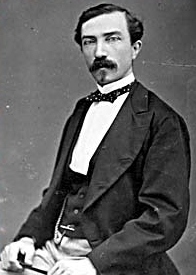| Epameinondas Deligeorgis | |
|---|---|
 | |
| Born | 10 January 1829 Tripolis, Greece |
| Died | 14 May 1879(1879-05-14) (aged 50) Athens, Greece |
| Occupation(s) | lawyer, politician |
| Known for | served as Prime Minister of Greece 6 times |
| Father | Dimitrios Deligeorgis |
| Relatives | Leonidas Deligeorgis [el] (brother) |
Epameinondas Deligiorgis (Greek: Επαμεινώνδας Δεληγεώργης, pronounced [epamiˌnonðas ðeliʝiˈorʝis]; 10 January 1829 – 14 May 1879) was a Greek freemason, lawyer and politician - the youngest Prime Minister of Greece, taking office at the age of 36. His parliamentary activity numbered 13 years and he served as Prime Minister of the country 6 times.
He was born in Tripoli, Arcadia, the son of Dimitrios Deligeorgis, a revolutionary and politician from Missolonghi who participated in the Greek War of Independence. Deligiorgis studied law at the University of Athens. He began practicing law in 1850, and in the years that followed became the idol of the liberal "golden youth". He was elected for the first time as an MP of Missolonghi in 1859 and openly opposed the dynasty, which resulted in his being excluded from the Parliament.
He was not a proponent of the Megali Idea (Great Idea) and thought that a better solution to the Eastern Question would be to improve the condition of the Greeks living in Ottoman-controlled Macedonia, Epirus, Thrace and Asia Minor by liberalising the Ottoman Empire.
According to the writer of his biography : Epaminondas Deligeorgis belonged to a new generation of liberal politicians (Golden Youth) who contributed decisively to the liberalization of the country. Militant demonstrations, dense columns (in journalistic publications such as "Panhellenion", "Athena", "Nea Genea"), participation in military postures, fiery speeches in parliament were some of the characteristics of this generation of politicians, who embodied the concept of the "nation in arms", i.e. the combination of nationalism and radical liberalism. He died in Athens, aged 50.
References
- Note: Greece officially adopted the Gregorian calendar on 16 February 1923 (which became 1 March). All dates prior to that, unless specifically denoted, are Old Style.
- "Δεληγεώργης Επαμεινώνδας".
- "Επαμεινώνδας Δεληγεώργης. O πιο νέος Έλληνας πρωθυπουργός". 12 February 2024.
- https://archive.today/20150525195752/http://www.elia.org.gr/EntryImages%5C1%5C%CE%94%CE%95%CE%9B%CE%97%CE%93%CE%95%CE%A9%CE%A1%CE%93%CE%97,%20%CE%BF%CE%B9%CE%BA%CE%BF%CE%B3%CE%AD%CE%BD%CE%B5%CE%B9%CE%B1.rtf
- "Πανεπιστήμιο και πολιτική: Η περίπτωση του Ε. Δεληγεώργη". 6 June 2022.
Sources
- Georg Veloudis: "Delijeorjis, Epaminondas", in Biographisches Lexikon zur Geschichte Südosteuropas. Vol. 1. Munich 1974, pp. 385–387.
| Political offices | ||
|---|---|---|
| Preceded byAlexandros Koumoundouros | Prime Minister of Greece 20 October - 3 November 1865 (o.s.) |
Succeeded byDimitrios Voulgaris |
| Preceded byAlexandros Koumoundouros | Prime Minister of Greece 13 - 28 November 1865 (o.s.) |
Succeeded byBenizelos Roufos |
| Preceded byThrasyvoulos Zaimis | Prime Minister of Greece 9 July - 3 December 1870 (o.s.) |
Succeeded byAlexandros Koumoundouros |
| Preceded byDimitrios Voulgaris | Prime Minister of Greece 8 July 1872 – 9 February 1874 (o.s.) |
Succeeded byDimitrios Voulgaris |
| Preceded byAlexandros Koumoundouros | Prime Minister of Greece 26 November - 1 December 1876 (o.s.) |
Succeeded byAlexandros Koumoundouros |
| Preceded byAlexandros Koumoundouros | Prime Minister of Greece 26 February - 19 May 1877 (o.s.) |
Succeeded byAlexandros Koumoundouros |
This article about a Greek politician is a stub. You can help Misplaced Pages by expanding it. |